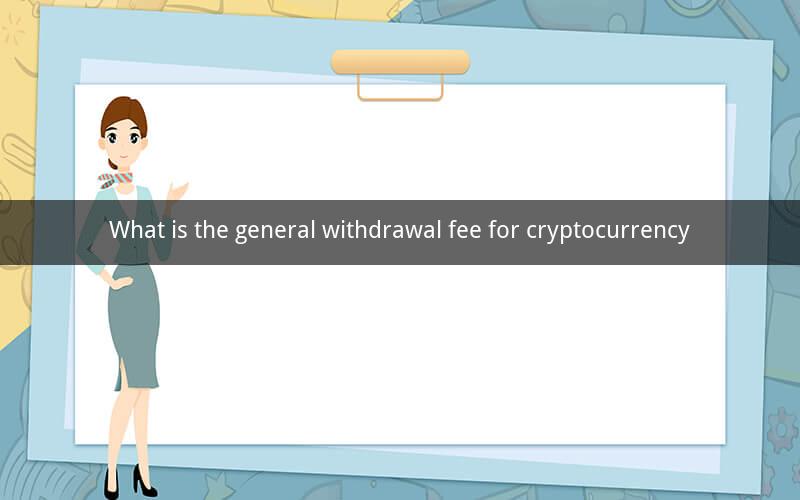
Directory
1. Introduction to Cryptocurrency Withdrawal Fees
2. Factors Influencing Withdrawal Fees
3. Types of Withdrawal Fees
4. Common Cryptocurrency Withdrawal Fees
5. Comparing Withdrawal Fees Across Different Exchanges
6. The Importance of Understanding Withdrawal Fees
7. Strategies to Minimize Withdrawal Fees
8. Future Trends in Cryptocurrency Withdrawal Fees
9. Cryptocurrency Withdrawal Fees and Regulatory Compliance
10. Conclusion
1. Introduction to Cryptocurrency Withdrawal Fees
Cryptocurrency withdrawal fees are charges imposed by exchanges or wallets when users transfer their digital assets to external addresses. These fees vary widely depending on the platform, the amount of cryptocurrency being withdrawn, and the current network congestion. Understanding these fees is crucial for users to make informed decisions when managing their cryptocurrency assets.
2. Factors Influencing Withdrawal Fees
Several factors can influence the withdrawal fees associated with cryptocurrency transactions:
- Network congestion: Higher network congestion leads to higher fees as miners prioritize transactions with higher fees.
- Transaction size: Larger transactions generally incur higher fees.
- Exchange or wallet policies: Different exchanges and wallets have varying policies on withdrawal fees.
- Cryptocurrency type: Some cryptocurrencies may have higher or lower withdrawal fees compared to others.
3. Types of Withdrawal Fees
Withdrawal fees can be categorized into several types:
- Network fees: These are paid to the miners for validating and processing the transaction.
- Exchange fees: Exchanges may charge a fee for processing the withdrawal request.
- Wallet fees: Some wallets may charge a fee for facilitating the transaction.
4. Common Cryptocurrency Withdrawal Fees
The following are some common withdrawal fees for popular cryptocurrencies:
- Bitcoin: $5 - $20
- Ethereum: $0.20 - $2
- Litecoin: $0.10 - $0.50
- Ripple: $0.005 - $0.01
- Bitcoin Cash: $0.05 - $1
It's important to note that these fees can fluctuate based on the factors mentioned earlier.
5. Comparing Withdrawal Fees Across Different Exchanges
When choosing a cryptocurrency exchange, it's crucial to compare withdrawal fees. Some exchanges may offer lower fees but may have higher trading fees or other hidden costs. Users should carefully evaluate the overall cost of using each platform.
6. The Importance of Understanding Withdrawal Fees
Understanding withdrawal fees is essential for the following reasons:
- Budgeting: Users can plan their expenses and make informed decisions about when to withdraw their cryptocurrency.
- Avoiding surprises: Users can avoid unexpected charges and better manage their digital assets.
- Comparison shopping: Users can compare different platforms based on their fees and choose the most cost-effective option.
7. Strategies to Minimize Withdrawal Fees
Here are some strategies to minimize withdrawal fees:
- Use smaller transaction sizes: Breaking up large transactions into smaller ones can reduce fees.
- Wait for lower network congestion: Withdrawals during periods of lower network congestion may result in lower fees.
- Choose exchanges with competitive fees: Look for exchanges that offer lower withdrawal fees without compromising on other aspects.
- Use wallets with lower fees: Some wallets may offer lower withdrawal fees compared to others.
8. Future Trends in Cryptocurrency Withdrawal Fees
The future of cryptocurrency withdrawal fees is uncertain, but some potential trends include:
- Blockchain scaling solutions: Implementing blockchain scaling solutions may reduce transaction times and fees.
- Regulatory changes: Governments may impose new regulations on cryptocurrency withdrawals, potentially affecting fees.
- Increased competition: As more exchanges and wallets enter the market, competition may drive down fees.
9. Cryptocurrency Withdrawal Fees and Regulatory Compliance
Regulatory compliance plays a significant role in cryptocurrency withdrawal fees. Exchanges and wallets must adhere to regulations related to anti-money laundering (AML) and know your customer (KYC) requirements. These regulations may impact the cost of withdrawals.
10. Conclusion
Cryptocurrency withdrawal fees are an essential aspect of managing digital assets. Understanding these fees, their factors, and strategies to minimize them can help users make informed decisions and save money. As the cryptocurrency market evolves, it's crucial to stay informed about changes in withdrawal fees and regulatory compliance.
Questions and Answers
1. What is a network fee in cryptocurrency?
- A network fee is a charge paid to miners for validating and processing cryptocurrency transactions.
2. How can network congestion affect withdrawal fees?
- Network congestion can lead to higher fees as miners prioritize transactions with higher fees.
3. What are some common withdrawal fees for popular cryptocurrencies?
- Common withdrawal fees include Bitcoin ($5 - $20), Ethereum ($0.20 - $2), Litecoin ($0.10 - $0.50), Ripple ($0.005 - $0.01), and Bitcoin Cash ($0.05 - $1).
4. How can users compare withdrawal fees across different exchanges?
- Users can compare withdrawal fees by evaluating the overall cost of using each platform, including trading fees and other hidden costs.
5. What strategies can users use to minimize withdrawal fees?
- Users can minimize withdrawal fees by using smaller transaction sizes, waiting for lower network congestion, choosing exchanges with competitive fees, and using wallets with lower fees.
6. How do blockchain scaling solutions impact withdrawal fees?
- Blockchain scaling solutions can reduce transaction times and fees by increasing the network's capacity to process transactions.
7. What role does regulatory compliance play in cryptocurrency withdrawal fees?
- Regulatory compliance, such as AML and KYC requirements, can impact the cost of withdrawals for exchanges and wallets.
8. What are some potential future trends in cryptocurrency withdrawal fees?
- Potential future trends include blockchain scaling solutions, regulatory changes, and increased competition.
9. How can users stay informed about changes in cryptocurrency withdrawal fees?
- Users can stay informed by following news and updates from cryptocurrency exchanges, wallets, and regulatory agencies.
10. Why is it important for users to understand withdrawal fees?
- Understanding withdrawal fees helps users budget, avoid surprises, and make informed decisions when managing their digital assets.